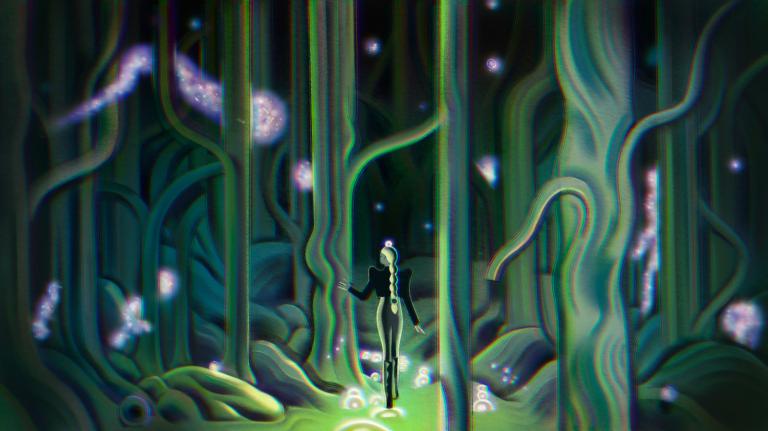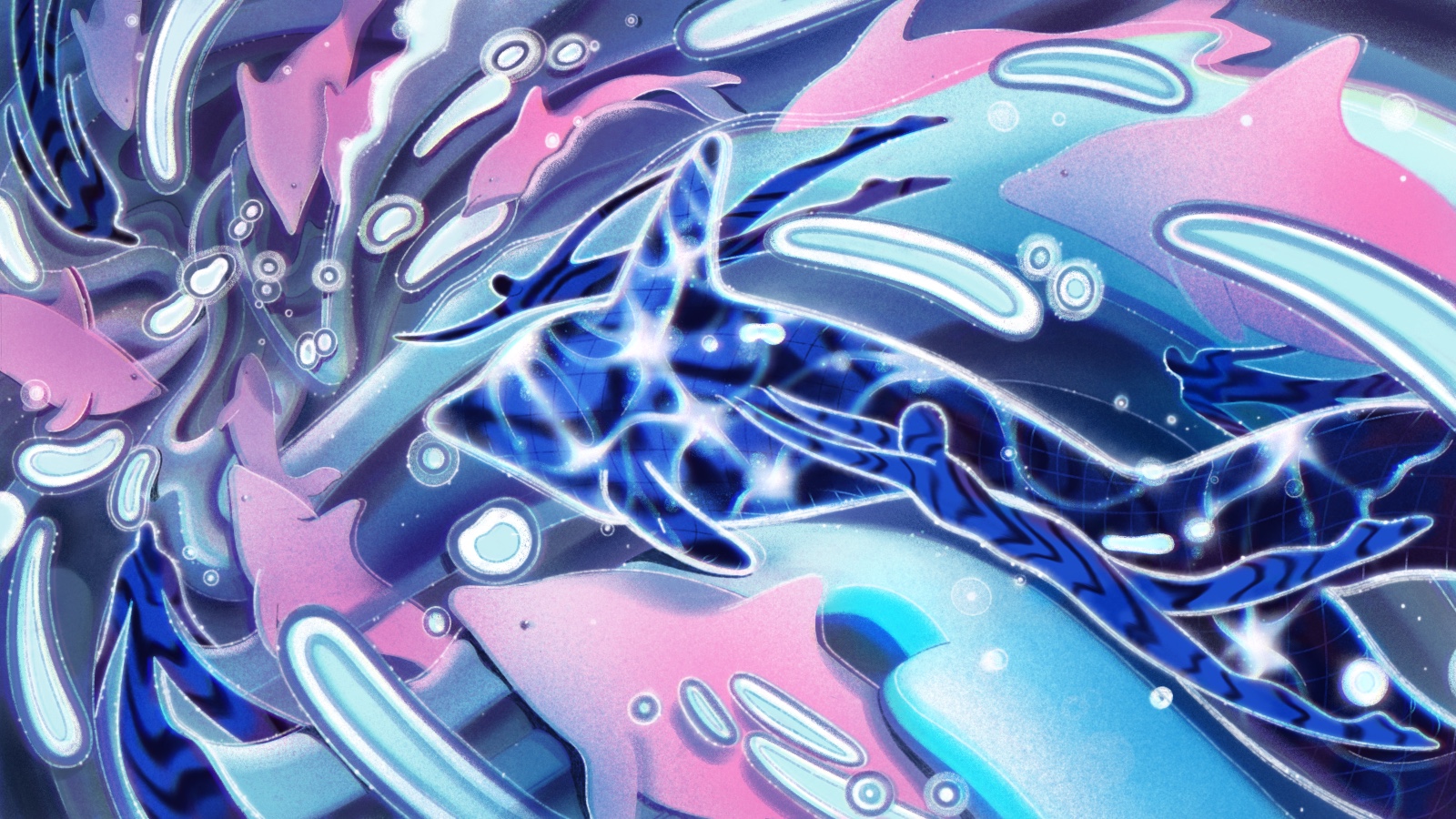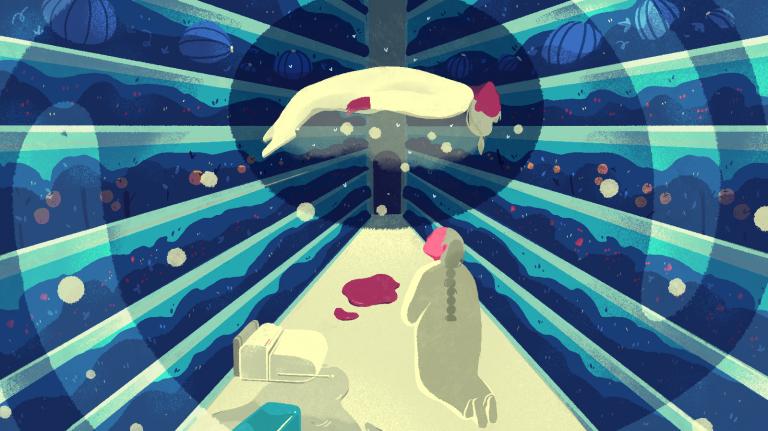This story is part of Imagine 2200: Climate Fiction for Future Ancestors, a climate-fiction contest from Grist. Read the 2021 collection now. Or sign up for email updates to get new stories in your inbox.
* * *
Maradi, Niger: 2038
“It’s not working,” Tsayaba says. She shakes her head in disgust. “Kai!”
“Just wait,” Ouma says, adjusting her scarf with shivering hands. “Yi hankali. Give it a minute.”
It’s a cold, dusty day — harmattan season is so unpredictable now, even with the weather drones they balloon up from Zinder and Niamey. The sky is choked gray, so full of dust that the sun is a smeary yellow blob that makes Ouma think of a lemon candy.
She takes one from her jacket pocket and hands it to Tsayaba, who stares at it. “This has a plastic wrapper, Ouma,” she says. “Are you trying to drive me crazy?”
Ouma unpeels it and pops it into her own mouth instead. She knows her older cousin is already a little — not crazy; Ouma has been reading e-flets on why that is a stigmatized and offensive term — but a little different. In a good way, a driven way, a furious-thrumming-brain-too-big-for-her-beautifully-braided-head way.
That is why she made money moving memes, why she went away to Nigeria to study biochem in Kano and then biotech in Lagos, why she dropped out to set up her own tiny genelab. But she never stopped messaging, and calling when she could.
And now she is back here, in dusty Maradi, where she and Ouma grew up together, to test out the little biological machine she has been tinkering with for a year and a half. Or for a whole damn century, depending on when you ask her.
The nameless thing is about the size of Ouma’s clenched fist, modeled after a waxworm’s digestive tract, slick-skinned and perched on cilia that should let it scuttle easily through the sand in a way jointed Bostobots still struggle with.
But the thing is not moving.
“It was perfect in all the sims,” Tsayaba mutters. “In the lab tests, too. I filled my whole room with sand and trash.”
She punches a few rubbery keys on her brute of a laptop, the one Ouma knows she tried to build only from old parts, to avoid unethically mined gold and tungsten, but finally had to buy new semiconductors for. Hopefully this will not be a giving-in day, too.
“Lots of things don’t work out here,” Ouma says, bracingly. “My blockphone glitches sometimes, too.”
She winces after she says it, because she doesn’t think blockphones and crawly genelab things work the same way, and she doesn’t want Tsayaba to think she is stupid. But her older cousin is too kind to think things like that, and too distracted anyway.
“I wanted to do it here,” Tsayaba mutters, rubbing her eyes. “I wanted this to be the place it starts, because it’s the place I started. Where our family started. Where you taught me I can do important things.”
Ouma feels proud of that, because she always assumed that the important things were learned in Kano and Lagos. She wants Tsayaba’s thing to work, so she crouches down and presses the wrapper from her lemon candy against its membranous skin and hopes hard.
The wrapper slides through an unseen mouth and dissolves into tiny grains that swirl through the thing’s rubbery body, like a little sandstorm. The thing wriggles its cilia feet. It notices the flimsy black shopping bags all around, sticking up from the street like blooming flowers, and suddenly it is hungry. It starts to move.
“It just needed to whet its appetite,” Ouma says.
“I was going to try that next,” Tsayaba says, but she beams. She wraps her arm around Ouma. “Thank you. And thank you for coming outside with me. I know you are freezing.”
Ouma squeezes her back, imagining Tsayaba’s dream: a whole swarm of the biomachines crawling through the sand, swimming through the ocean, breaking down tons upon tons of low-density polyethylene without a wisp of greenhouse gases escaping. It’s a thrilling vision.
“What will you name it?” she asks. “Maciyin roba? Plastic eater?”
Tsayaba smiles without taking her eyes off the thing. “I don’t know. I’ll think.”

Prague, Czechia: 2044
Kat meets Jan off Lask@, one of those local splinter apps that only takes NFT payments and swears to never memorize your face and biometric data and send it straight to the Devil. The rub with going splinter is that the dating pool shrinks to a dating puddle; the un-rub is that the people splashing around in it tend to be more interesting.
Like Jan the nouveau-anarchist, who brought his own bottle of bacteria-brewed beer to the top of Letna Hill and is somehow pulling off a floral-printed suit. He offers an elbow — Prague is post-vax, but the Big One hit hard here and the greeting hung on.
“Which is for the best,” Jan says. “Because the Bigger One, you know, it’s around the corner.”
Kat doesn’t want to think about that, not tonight. She thinks about it enough during the daytime, where her job is prepping samples and lab equipment at Charles University, for the researchers working on plug-and-play mRNA to tackle whatever superbug pops up next.
She thinks about it every too-hot summer, whether she spends it here in Prague or back home in Rotterdam. Climate shift means people shift means overcrowding and deforestation and more vectors for disease and —
“Let’s get drunk,” Kat says, because it’s been a long week.
Jan’s amenable to that. They finish the bottle and refill it at the garden brewery; Kat orders in her clumsy Czech, without needing to consult her babelapp, and Jan applauds in a way that would feel sarcastic if not for his beaming smile.
Three or four bottles later, they take a walk around Holešovice. It’s beautiful at night, in the blurry orange glow of the streetlamp: the old Communist-era architecture is retrofitted with solar windows and rooftop gardens, green and gray measures. The parks have all been expanded.
They wander through one with the backs of their hands not quite brushing, then Jan looks at her in a particular way and Kat really wants to kiss him right on his beer-smelling mouth, so she does it. The electricity of it makes her forget about all the incoming disasters.
Three or four minutes later, they’re at Kat’s apartment. The make-out starts in the cramped lift and continues into the cramped flat. She clears off the couch and then helps Jan peel his shirt off, both of them fumbly and excited, and when it clears his tousled head Kat is face-to-face with a hollow cheeked woman in a boat.
Kat blinks. The woman blinks back. The crisp image, rendered in nano ink, is a livestream.
“Uh, Jan? Who’s on your stomach?”
Jan glances down. “Oh. I forgot.”
He prods his slightly beer-wobbly gut. A name appears in the nano ink: Tharanga Mendis.
“It is hard for me to read upside down,” Jan says. “But that. She is a refugee from Negombo. The wet bulb temperature is 38 now. People cannot sweat, so they leave or they die.”
Kat loses her booze buzz to the old cycle: guilt, annoyance at having to feel guilt on a night where all she wanted to do was hook up, guilt for the annoyance.
“You shouldn’t be skincasting people’s suffering,” she says sharply. “Or sharing their faces. It’s gross.”
Jan’s slate-gray eyes turn solemn. “It’s only sort of gross,” he says. “Her face is already known. This is a feed from border surveillance. I’m watching them watching her, and everybody else in the boat.”
“You shouldn’t be skincasting people’s suffering,” she says sharply. “Or sharing their faces. It’s gross.”
Kat frowns. “Accountability?”
Jan shakes his head and grins his lopsided grin. “Better,” he says. “Catalonia is only letting in migrants with proof of employment.”
The smart tattoo shifts, showing a child now. They pull faces at whatever border drone is circling their vessel.
“With enough people streaming them, they can be classified as performers,” Jan says. “We had a legal AI do up the contracts.” He holds up his phone, and Kat sees the same feed. “I have it going everywhere,” he says. “Not just the tattoo.”
“If that works, it’s only going to work once,” Kat says, slumping down onto the couch. “You know that, right?”
“That’s OK,” Jan says. “We have lots of ideas. We just have to keep, you know, implementing. One little thing at a time.” His forehead creases. “Did you still want to have sex?”
Kat rubs at her face. “I don’t know. Kind of.” She glares. “How do you forget you have that playing on your stomach? How can you keep things — partitioned, like that?”
“Because it’s not my responsibility,” Jan says. “It’s everybody’s responsibility. And not everybody is doing their part, but a lot of people are, and I trust those people a lot.” He shrugs. “So do what you can, let go of the rest.”
Kat shuts her eyes. The last thing she wanted to think about tonight was climate refugees battling draconian border security, but the world is too small, too hot, too claustrophobic, to avoid thoughts like that anymore — even for a night.
“Shirt stays on,” she says, pushing it back into his chest. “But, uh, send me the stream first.”
This is just how things are now. Kat does what she can, and lets go of the rest.

Site of IDC-59, Australia: 2066
It’s so strange to be back at the detention center, to walk along the barbed wire fence and past the somber gray tents. Eli’s grandson pleaded with him not to come, because he is learning about trauma responses in school and thinks the place might trigger a panic attack Eli’s old hard-thumping heart can no longer take.
But Eli wanted to come, badly. He wanted to remember. Now he leads the way toward E-Tent, where he grew up with his abbá and ammá and the ghosts they had brought with them when they fled Myanmar for their lives. He scuffs his feet in the red dirt, and remembers pretending the rippled sand was a wave-tossed sea. He fantasized about water a lot. There was never much of it in the camp.
There still isn’t. The sun is blistering hot and the new refugees, splayed in the scant shade of the tents, have salt crusted around their lips. They move their mouths in the way Eli knows means their tongues are dry, bone-dry. Their faces are tired, and familiar even though he doesn’t know them.
The new guards, mostly men, wear the same old dark green jackets. Eli knows that most of them are lounging inside with a fan, but the ones patrolling outside are drenched in sweat, irritable from the heat and ready to displace their annoyance at the slightest provocation.
Their heavy boots are red from the dust and black fobs hang from their belts like ticks. All the children daydreamed about stealing one of those fobs, but instead of leaving the camp, which was the entire world, they mostly wanted to get into the kitchens to find the chocolate bars one particular guard always ate right in front of them.
Eli’s ammá told him, later in the tent, that cruelty filters downward — like the mercury in the fish she used to study.
That was the same guard who tripped him, once, when their game of tag got too close to him. Eli remembers sprawling in the dirt and smacking his head on a piece of gravel. He remembers seeing the surprise and regret on the man’s bristly face, but only for an instant, before he sealed it up with the usual scowl and told Eli to go have his cut cleaned.
Eli’s ammá told him, later in the tent, that cruelty filters downward — like the mercury in the fish she used to study. She said the hardest thing in the world to do is absorb someone else’s cruelty and not pass it along.
“How are you feeling?” little Mohib asks, squeezing his hand. “Dada?”
“It’s very well done,” Eli says, and pulls off his sweat-suctioned goggles.
The virtual memorial disappears, leaving only a tracery of AR guidelines in the red dirt, a few scuttling oumas hunting down traces of plastic.
The actual camps vanished more slowly, through years of policy battles fought by second-generation migrants and certain Indigenous politicians. First the off-shore detention centers were dismantled, then those of the mainland, and now, at last, they exist only as a bad memory.
Eli thought it was better to forget completely. The idea of the memorial — splicing the same surveillance systems that kept so many desperate souls contained, all the footage from those miserable years — somehow seemed like moving backward.
But now that he has seen it, the forgiving without forgetting, he realizes its power to ensure the cruelty is not passed along.
“Your heart, though,” Mohib says, blinking. “How is your heart?”
Eli looks down at his grandson. For a moment, despite the crisp, clean runners and bioelectric shirt, he sees himself at the same age: scrawny, dark-eyed, still full of a restless energy. But he will never have fences around him.
“Full,” Eli says. “And good.”
Mohib breathes a big sigh of relief that implodes his small chest. Eli breathes, too.

Cygnet Community, Dënéndeh Territory: 2099
Suma’s idea is ridiculous, when Cade takes a step back from it, but they’re fully invested now. They’ve both been scrounging materials for weeks, digging through every tech-tomb in walking distance of the commune, hunting down everything the printer needs to make a tweaked babeltech rig.
So when Suma comes skipping out of the solar-coated printer shack on Thursday afternoon, waving the final product in the air, Cade is chest-choked with hope and anxiety for the ending of their kid’s latest dream. Suma is bright for a 10-year-old, but the blueprint was complicated as shit and she’s not Tsayaba Issoufou.
“It’s going to work,” Suma says sternly, and Cade realizes she somehow ferreted out their doubt.
Cade considers managing expectations. “Su,” they say, “I’m really, really proud of you.”
Suma’s brown cheeks flush, and she does the little wriggle she does to absorb excess praise.
Cade helps her set up the rig right along the garden fence, where the moose has been doing the most damage. At first the young bull was content to crane over the top and snatch gene-tweaked apples from the spindliest tree branches, but lately he prefers smashing through the metal mesh and trampling all over the rhubarb.
The commune was about to reach a unanimous vote for printing up a swarm of botflies to keep the moose away — their little electric stingers pack enough punch even to deter the occasional pizzly bear that wanders south — but Suma proposed negotiating. Which meant establishing a channel of communication.
Cade watches as Suma checks all the wireless ports and makes sure the responder is safely encased in its rubber box. Their daughter has always been fascinated by non-human persons: The orca colony off the coast of Old Vancouver, which used babeltech to negotiate fishing territories with the Northwest Coalition of First Nations. The roving corvid communities that sometimes fill the talknet with jumbled stories and legal disputes.
As far as Cade knows, nobody has ever successfully used babeltech to talk to a moose before. But improbable doesn’t mean impossible — every time Cade looks around, they see improbable things that got done. Replacing the vast canola and wheat fields with polycultures. Dismantling the bones of the ancient oil industry, all the wells and rigs and derricks, to build wind farms and supply commune printers with raw materials.
Absorbing the countless climmigrants from flooded islands and deadly heat, settling them across the prairies instead of the vanishing coastal cities, establishing hundreds of small villages like the one Cade and Suma call home.
So when the bull shows up the next morning, and bed-headed Suma grabs her tablet and races to the porch, Cade hopes they can add talking to a moose to the list. Their daughter links up to the babeltech. They both watch as the bull ambles up to the fence, as per usual, and starts sniffing.
They both watch as the bull ambles up to the fence, as per usual, and starts sniffing.
He feels the static field from the babeltech, and wriggles his big, bony shoulders in a way that almost reminds Cade of their daughter.
“Hello,” Suma says, voice shaking a bit from excitement. “My name is Suma.”
The moose swings his big head left, then right. Snorts.
“Can you stop wrecking the fence?” Suma asks. “We could give you a bucket of apples to eat, if you like. And some spare rhubarb to step on.”
The babeltech kicks in, and the synthesized representation of the moose’s non-human person neural processes comes blaring through Suma’s tablet.
“FUCK. FUCK. FUCK. FUCK.”
Suma blinks in surprise. “Cade?” she says, in a low voice. “Why’s he saying that?”
Cade tries to keep the laugh down, and it nearly bursts their belly. “Uh, I think it’s rutting reason,” they say. “Maybe he’ll be more conversational in a couple weeks.”
Suma purses her lips. “If the moose is allowed to say it, can I say it, too?”
“Just once,” Cade says. “Since you got babeltech to work with a cervine. You earned it, kiddo.”
Suma grins. “Even if he only cusses at us, this is still so fucking cool.”

Ko Phangan, Thailand Republic: 2132
Nam takes her boat out in the late afternoon, when the sky is travel-holo blue and sunshine is sparkling the water. She takes 112 net-friends with her. They fill her goggle lenses with animated hearts when they see the aquamarine waves, when they feel the salt spray on her nerve suit.
She cuts against the swell; the motor hums, converting solar charge to forward motion to sheer happiness. The clear water teems with shoals of technicolor fish and the occasional ouma straining microplastics. Sometimes she still comes across megaplastics, too: ancient Singha bottles and disposable gloves, relics of a time that sometimes feels mythical to her, that even had a king.
When her net-friends catch sight of the dolphins, their animated hearts explode. Nam feels her real heart beat a little faster, how it always does when she sees the pod cutting through the water, eight sleek pink acrobats racing and leaping then plunging back under. She knows each of their names, or at least she did last week. The dolphins like to change them, and give each other nicknames, which Nam told them is very Thai of them.
When her net-friends catch sight of the dolphins, their animated hearts explode.
She switches off the motor. Her little boat sloshes forward on the afterkick, drifts. The pod comes closer, squealing and chattering. In her goggles, Nam sees more net-friends joining her, hopeful today will be one of the special days.
Some come from as far away as Nueva Gran Colombia — she visited a paisa girl’s goggles once, and marveled at the lush green city with its every spare surface coated in carbon-catch moss. Another comes from Nuuk, the colorful capital of Kalaallit Nunaat where the buildings perch on telescoping legs.
Each person brings a small trickle of netcash, which is how Nam bought her extra nerve suit, and a pair of flutterwings for her littlest sibling’s birthday, and any other things that were not voted as food-shelter-health-happiness essentials.
As Truth noses up to the boat, grinning, Nam feels a grin spreading across her own face. “Sawadee,” she says. “How are you, Truth?”
Truth is the oldest dolphin in the pod, around 40 years old, but still the quickest and most playful. She’s always teasing the young calves, swimming upside down beneath them or blowing little air rings at their bellies.
“Squid squid squid,” Truth says, her chattering squeal turned to synth-speech by Nam’s goggles. “Delicious sea. Nam?”
Nam recognizes the last chirp, even without the synth-speech translation, and it always flutters her stomach to know the pod has given her a name. She reaches back into her cooler and pulls out a few of the freshly caught bobtail squid Truth prefers.
“Here,” she says, dropping them into the water. “Would you like to wear the suit today, Truth?”
Truth gobbles down the squid first, then circles the boat, then finally surfaces to squeal her answer. “Suit day! Yes. Yes. Rebarbative suit day!”
Nam blinks — sometimes the babeltech goes far afield with dolphin vocabulary. But the enthusiasm is clear, so she takes the extra nerve suit, the one she dissected and reassembled and waterproofed, and helps web it across Truth’s rubbery pink body. The other dolphins swirl around, curious.
“There are 308 net-friends watching,” Nam says. “Is that OK?”
“Friends,” Truth chitters. “Many swim. Nam swim. All swim.”
Nam caps the stream, then sits back in her boat and becomes the 309th. Her heart thrums with anticipation as the nerve suit links up, and then —
Nam is in the water, feeling the cool lap against Truth’s blubber-sheathed body, seeing through Truth’s low-light eyes. Nam is a good swimmer. She relishes the feel of a perfect stroke, her whole body working in harmony, from her cupped hand biting the surface to her flexed feet knifing through it.
Swimming as a dolphin is that, factor 10. One of the young bulls rockets down toward the seabed and Nam-with-Truth rockets after him, snout pointed for the sandy bottom. She scrapes her belly against the bottom, sends sand swirling everywhere.
Then up, up fast, tail threshing her toward the gauzy sunlight. The bull hurtles clear of the water and Nam-with-Truth does the same trick. There’s a beautiful never-ending moment of suspension, up in the sky, shedding the sea off her fins and flukes, perfectly weightless in a cloud of soft shattered glass.
Nam is flying through the air. Nam is lying in her boat. Nam is all around the world, joined to 300 other electric heartbeats. She knows it should probably feel mythical, like the age of ancient plastic, the age of gas-guzzling planes and freighters crisscrossing the oceans.
But instead, it just feels true.

Rich Larson was born in Galmi, Niger, has lived in Spain and Czech Republic, and is currently based in Grande Prairie, Canada. He is the author of “Annex” and “Tomorrow Factory,” and his fiction has been translated into over a dozen languages. His first screen adaptation, “Ice,” won the 2021 Emmy Award for Outstanding Short Form Animated Program.
Rebekka Dunlap is a Brooklyn-based Illustrator specializing in sci-fi dreams and digital mindscapes. You can find more of their work at http://www.rrebekkaa.com.





